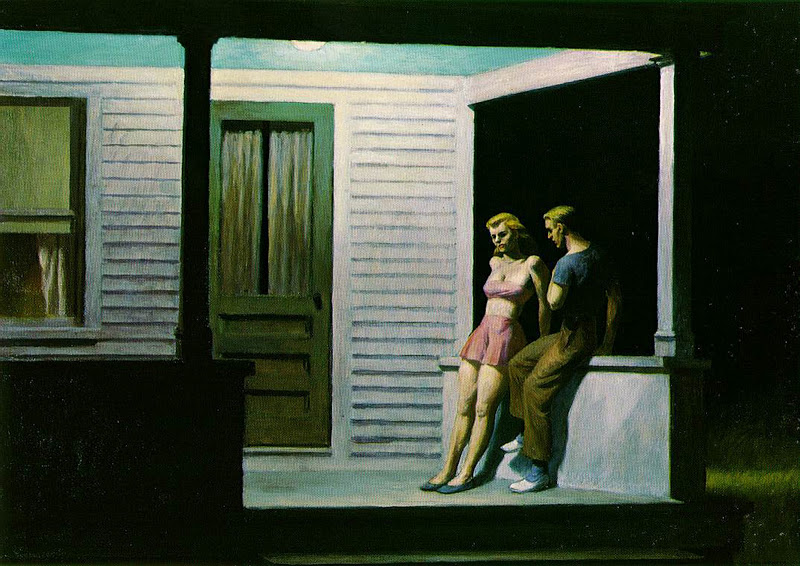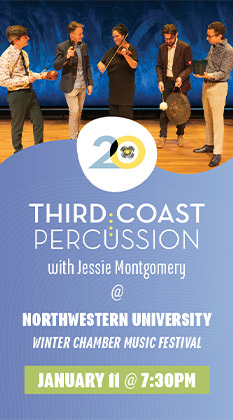CCM serves up a richly varied evening of American music
With recent days providing the first belated glimpse of summer in Chicago, Samuel Barber’s lucid panoramic impression of a summer night proved the perfect opener for Sunday night’s Chicago Chamber Musicians concert at Pick-Staiger Hall in Evanston.
Written in 1956 for the principle wind players of the Detroit Symphony, Summer Music was an immediate success with wind quintets around the country quickly picking it up.
Bassoonist Dennis Michel and hornist Gail Williams began the piece in perfectly balanced harmony, providing a sort of tranquil haze that returns time and time again as the undercurrent of the piece. Flutist Demarre McGill and clarinetist Larry Combs gave the impression of wild life skittering and birds chirping in their virtuosic runs. The Chicago Chamber Musicians delivered a performance of impeccable balance and clarity, with McGill’s powerful, expressive tone and body language bringing the images to life.
McGill took the stage again with pianist and CCM co-artistic director, Meng-Chieh Liu, to present a stirring performance of Ned Rorem’s Four Prayers. The work was composed in 2006 as part of Marya Martin’s “Flute Book for the Twenty-first Century” Project.
The Prayers contrast and build off one another, increasing the dialogue between the two instruments. The first depicts the flute alone in contemplation with the piano marking the steady passing of time with rich chords, while the second features a more aggravated singing line in the flute with a quickly flowing piano part. The third section is one of extremes, displaying the virtuosity and agility of Liu and McGill, and the final prayer is more of a confessional, cast in a beautiful dialogue between the two players. The performance was thought provoking and technically flawless.
CCM’s cellist, Clancy Newman, presented an exciting performance of one of his own compositions, The Pizzicato Piece. The work was spawned from playing around on the instrument and over the course of a year became the third movement of a four-movement suite.
With a strong rock influence, Newman began with a driving perpetual motion bass line that would continue throughout the composition, over which he would add a sharp melody and thrashing chords. It made for a fantastic virtuosic interlude that contrasted the previous pieces on the program and energized the audience.
Leonard Bernstein’s lovely Clarinet Sonata concluded the first half. Bernstein wrote it in 1941 at age 23 and the sonata marked his first finished composition.
Liu and Combs played with sensitivity and a great understanding of the interplay between the two instruments. They also seemed to play with West Side Story in mind, as several themes and the populist American idiom at times seem to foreshadow the composer’s famous musical to come.
The second half opened with Ellen Taaffe Zwilich’s Saxophone Quintet, which was composed in 2007, and premiered by the Chicago Chamber Musicians the following year.
Scored for this unusual combination, Zwilich’s quintet is striking for the skillful blend of a string quartet and alto saxophone. This was achieved through Zwilich’s clear understanding of the sonic possibilities of the instrument and saxophonist Taimur Sullivan’s gorgeous, sensuous tone.
Zwilich’s composition style is unique in that all the material is derived from the motives stated at the very beginning. This technique provides great unity between the three movements.
Many times throughout the piece the quintet was playing in fast, high-flying unison, without ever straying out of synch with one another. Each movement had an increased jazz element, which could prove to be difficult for many ensembles, although not these players. The tight syncopation and seamless interchange of swooping melodies was played with great conviction. provided a thrilling musical experience that was as much fun to watch as it was to hear.
The musicians in the quartet played with beautiful musicianship and balance. The standout was Jasmine Lin in the first violin chair who committed great energy and intensity into each note.
The concert ended with Aaron Copland’s beloved Appalachian Spring. The intimate Pick-Staiger stage was full with 13 musicians, with the audience feeling very close to the music making. The sounds blossomed from the ensemble with an ease and organic flow. All played with rich, full sound, and the great balancing the audience had come to expect after the superb performances that preceded the Copland Sunday evening.
The program will be repeated 7:30 p.m. Monday at Gottlieb Hall at the Merit School of Music. chicagochambermusic.org
Tim Christiansen graduated from Augustana College with a bachelor of arts in music and business administration in 2012. He has played the violin since youth as well as jazz guitar. His true passion lies with listening to and continuing to learn about classical music, and sharing his enthusiasm for it. He is pursuing a career in orchestra management.
Posted in Performances




Posted May 10, 2013 at 8:47 am by Javelinda
Great review! I wish I was closer, based on the description I would love to see this program celebrating Americana. This sounds like the ideal way to introduce pieces that an audience may not be familiar with as part of a larger theme program. Thanks for writing, can’t wait to read more!
Posted May 10, 2013 at 3:42 pm by Effie Yang
Thank you for reviewing our concert, Tim!